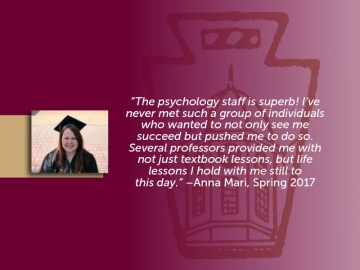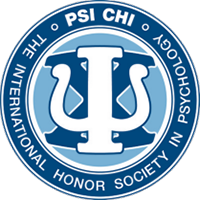Psychology

- Contact Information
-
- 570-389-4476
- Send an Email
-
218 Navy Hall
- Social Media
Today Bloomsburg. Tomorrow, endless possibilities.
Your journey begins here. Our structured and sequenced curriculum as well as 1:1 student to faculty advisement will help you to discern your long-horizon goals.

Psychology is a science
Accordingly, our major begins with a core sequence of research-oriented courses designed to foster a fundamental understanding of statistics as well as research design, implementation, and writing. Foundational knowledge and skills acquired in lower-division courses are reinforced through upper-division content courses and then applied through capstone experiences (APA, 2013, Goal 2: Scientific Inquiry and Critical Thinking).
Psychology is a broad discipline
This includes many different perspectives on behavior and mental processes. After surveying various content areas in PSYCH 101 General Psychology, Psychology majors sample from our balanced and wide-ranging curriculum. Psychology majors select content courses from offerings in developmental, abnormal/personality, social, applied, and experimental (learning, cognitive, neuroscience) psychology in partial fulfillment of the 36-credit major requirement.
Many Psychology majors will take more than 36 credits of Psychology courses as they explore the breadth and depth of the discipline (APA, 2013, Goal 1: Knowledge Base). Because the Psychology major requires only 36 credit hours, many Psychology majors choose to pursue a second major in a complementary discipline.
Psychology is a profession

Psychology majors learn and practice what it means to be ethical as researchers, academicians, and practitioners. Psychologists are guided by the ethical principles of beneficence/non-maleficence, fidelity and responsibility, integrity, justice, and the protection of people’s rights and dignity (APA, 2017). In other words, psychologists strive to do good and to avoid doing harm. They maintain their knowledge, work within the boundaries of their competence, and report ethical violations.
Psychologists do not lie, cheat, or steal when performing their professional duties. They promote fairness and avoid bias. Psychologists value the worth of all people and safeguard all people’s rights to privacy, confidentiality, and self-determination. Training for ethical understanding and competence is infused throughout our major, beginning with our core sequence of experimental courses and ending with our capstone experiences (APA, 2013, Goal 3: Ethical and Social Responsibility).
Psychology fosters a lifestyle of service
Psychologists are called upon to apply their psychological literacy to a broad range of situations in their homes, schools, workplaces, communities, and society at large. To bring this to the forefront, a defining feature of our curriculum is the requirement for psychology majors to successfully complete two capstone experiences.
These integrative and culminating courses challenge psychology majors to demonstrate and share their psychology knowledge and skills with others through oral presentations, written assignments, research activities, and fieldwork experiences (APA, 2013, Goal 4: Communication). In addition, these capstone experiences inspire psychology majors to develop meaningful professional direction for life after graduation (Goal 5: Professional Development).
Psychology Association
Psychology Association is a student-run an academic organization for psychology majors and minors to get involved in the psych community by participating in various events, activities and community service projects. The association is also open to people who want to learn more about psychology.
Psi Chi

Psi Chi is psychology's honor society and each semester invites the highest ranking psychology majors. Founded in 1929, Psi Chi encourages, stimulates, and maintains excellence in scholarship, and advances the science of psychology. Membership is open to graduate and undergraduate level psychology students. Each year, Bloomsburg University’s Chapter of Psi Chi invites the highest ranking psychology majors to membership in this international disciplinary honor society.



















